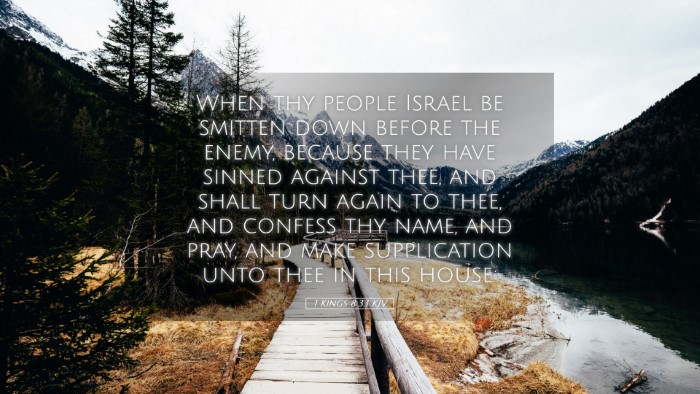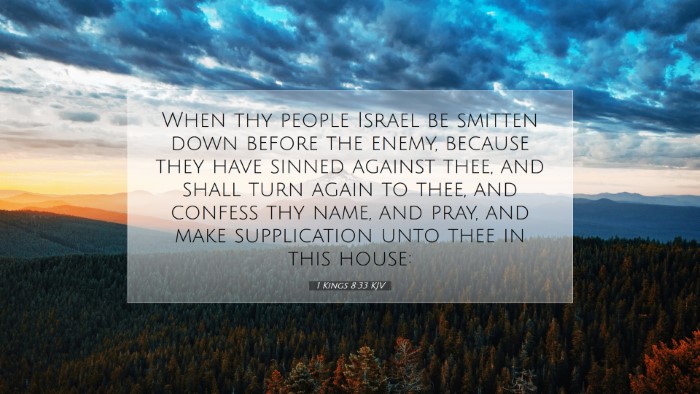Commentary on 1 Kings 8:33
1 Kings 8:33 states: "When thy people Israel be smitten down before the enemy, because they have sinned against thee, and shall turn again to thee, and confess thy name, and pray, and make supplication unto thee in this house:"
Context and Background
The context of this verse is found within the larger narrative of Solomon’s dedication of the temple. The temple of the Lord stands as a symbol of God’s presence and His covenant relationship with His people, Israel. As Solomon prays, he outlines various scenarios that may lead the people to seek God in repentance.
Theological Implications
This verse raises significant theological points about sin, judgment, and restoration. It emphasizes the cycle of disobedience and repentance, showing that despite human unfaithfulness, God remains merciful and ready to restore those who return to Him.
Sin and Its Consequences
Matthew Henry comments that the phrase “smitten down before the enemy” is indicative of the dire consequences that follow national sin. Sin brings forth not only individual shame but corporate judgment upon God’s people. This reflects the broader biblical perspective that sin has social and communal ramifications.
The Call to Repentance
Albert Barnes highlights that the condition of turning back to the Lord indicates the importance of repentance. Repentance involves a conscious decision to return to God and abandon sinful practices. This process includes confession and supplication, which are essential for sincere repentance.
God's Response to Repentance
Adam Clarke elaborates on the promise of God’s readiness to hear and respond to Israel’s prayers. This assurance of divine mercy signifies that God is ever willing to forgive and restore those who genuinely seek Him. The temple, as implied in this verse, serves as the central place of encounter with God, reinforcing the notion of worship and communion through prayer.
Practical Applications for Today
- National Repentance: This text challenges contemporary believers to consider the state of their own nation. It encourages prayer and intercession on behalf of one's country, particularly in times of moral decline.
- Prayer and Supplication: The act of turning back to God must involve both prayer and supplication, reminding believers of the importance of seeking God earnestly.
- Community Restoration: Churches and congregations can take lessons from this scripture on how to approach times of spiritual stagnation or decline through collective repentance and seeking God’s favor.
Conclusion
1 Kings 8:33 stands as a powerful reminder of the consequences of sin but equally points to the hope found in repentance. It emphasizes that despite the failures of His people, God remains faithful. The temple, and by extension, the presence of God with His people, provides a pathway for restoration and forgiveness. For pastors and theologians, this verse serves not only as a basis for understanding God’s justice and mercy but also as a source of encouragement to lead their congregations back to sincere worship through prayer.


